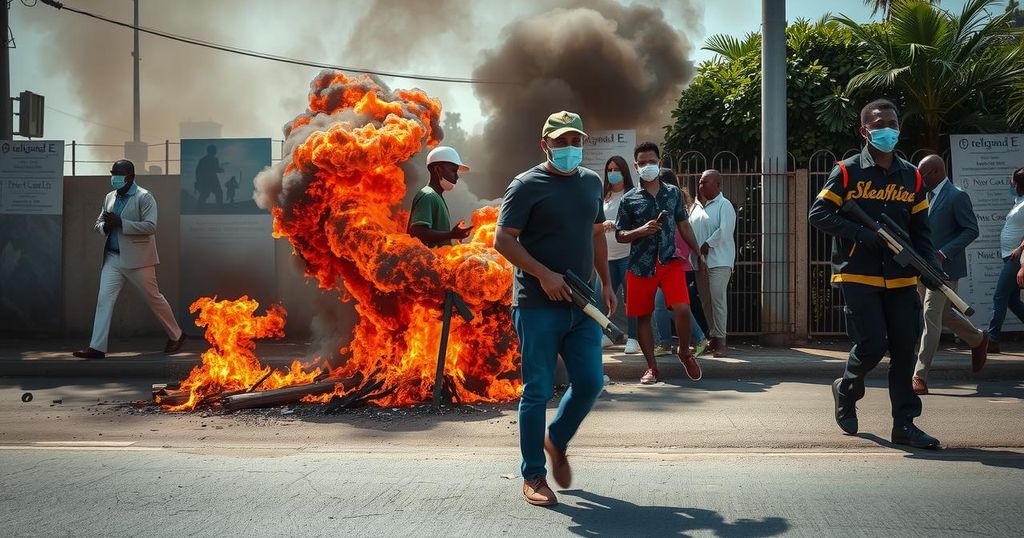World news
2024 ELECTIONS, AFRICA, BERNADINO RAFAEL, CONSTITUTIONAL COUNCIL, CORRUPTION, DANIEL CHAPO, DEMOCRACY, FILIPE NYUSI, FRELIMO PARTY, GOVERNANCE, MOZAMBIQUE, MOZAMBIQUE CONSTITUTIONAL COUNCIL, NEW YORK TIMES, NORTH AMERICA, POLITICS, U. S, UNITED STATES, UPI, VAN, VANANCIO MONDLANE
Ethan Kim
0 Comments
Political Unrest in Mozambique Leaves 21 Dead Amid Contested Elections
At least 21 individuals have died amid significant political unrest in Mozambique following disputed election results. Opposition leader Vanancio Mondlane claims electoral fraud and has pledged to assume the presidency on January 15, arousing protests and violence. U.S. officials have recognized irregularities in the electoral process, urging non-violent dialogue to restore peace and accountability.
At least 21 fatalities have been reported in Mozambique amidst escalating political turmoil that has unfolded since the previous Monday. The unrest emerged following the approval of controversial election results on October 9 by the Mozambique Constitutional Council, which declared the ruling Frelimo Party candidate Daniel Chapo the victor. Opposition leader Vanancio Mondlane, who asserts that the election was rigged, has vowed to assume the presidency on January 15 despite his electoral defeat.
The violence has quickly intensified, leading not only to numerous deaths but also over 70 arrests, as law enforcement clashed with demonstrators. Mondlane’s supporters contest the election results, which awarded Chapo 65.2% of the vote compared to Mondlane’s 24%. The election’s integrity has been widely questioned, and indications of voting irregularities have surfaced, lending credence to Mondlane’s grievances.
In a recent address broadcast via Facebook Live, Mondlane firmly rejected the Constitutional Council’s findings and announced his intention to install himself as president on January 15. He has emphasized that his movement does not endorse violence, calling on his supporters to uphold peace in the face of adversity. President Filipe Nyusi is set to leave office after two terms, and tensions continue to rise as more than 100 individuals have reportedly died in protests since the electoral results announcement.
Human rights organizations have pointed fingers at Mozambique’s security forces, attributing many of the deaths to their actions during the civil unrest. However, Police Commander Bernadino Rafael insists that law enforcement has acted solely in self-defense when confronted by hostile protests. In response to the crisis, U.S. officials have endorsed Mondlane’s claims regarding the legitimacy of his concerns over the elections, urging all parties to engage in non-violent dialogue to restore peace.
Matthew Miller, a Department of State spokesperson, noted, “Civil society organizations, political parties, the media, and international observers, including those from the United States, cited significant irregularities in the tabulation process, as well as concern about the lack of transparency throughout the election period.” He emphasized the essential need for accountability regarding human rights violations and the necessity of free elections that genuinely reflect the will of the Mozambican populace.
The recent political unrest in Mozambique stems from the aftermath of the October 9 elections, which solidified the longstanding control of the Frelimo Party over the country. This electoral outcome has been met with significant skepticism, leading opposition leader Vanancio Mondlane to challenge the legitimacy of the results. The increasing frustration among the populace and allegations of election irregularities have exacerbated tensions, resulting in widespread protests and violent confrontations with security forces. U.S. officials have asserted the need for transparent electoral processes in Mozambique to ensure peace and uphold democratic principles.
In summary, the unfolding events in Mozambique highlight a critical juncture in the nation’s political landscape, marked by allegations of election fraud and rising tensions between opposing factions. With at least 21 deaths reported and calls for accountability from international observers, the situation remains dire. Mondlane’s determination to assert leadership amidst these challenges reflects the underlying discontent regarding governance and the electoral process. The emphasis on non-violence is crucial as Mozambique navigates this complex crisis.
Original Source: www.upi.com




Post Comment